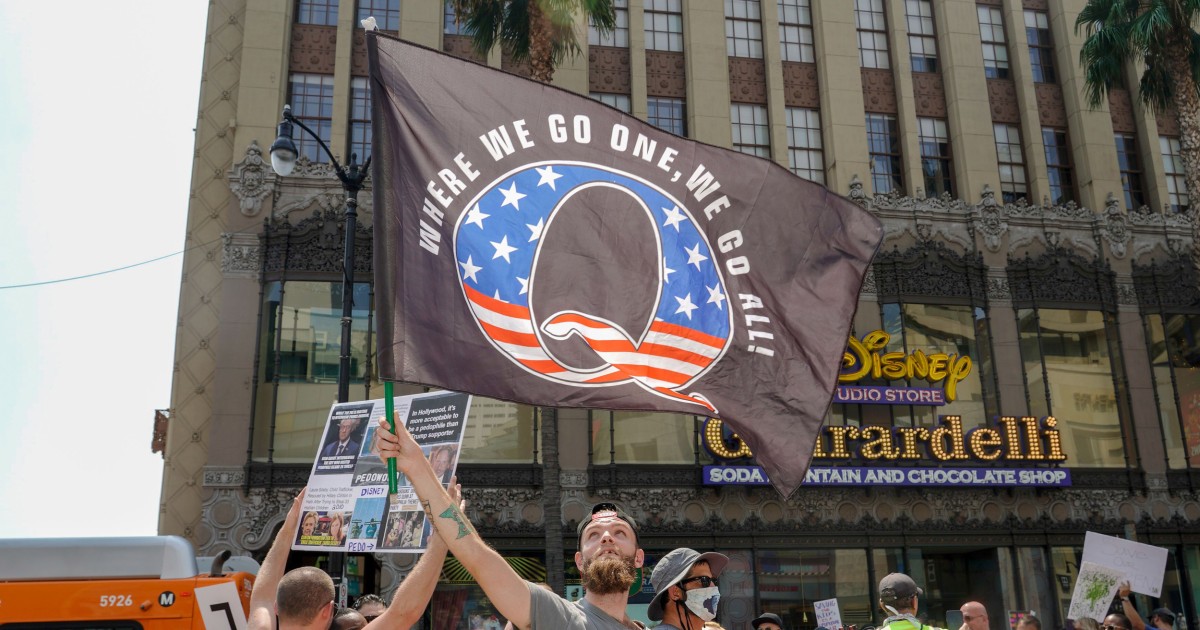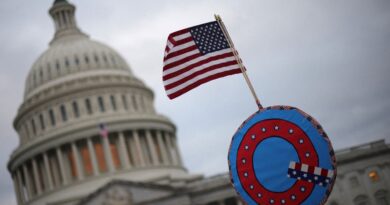Trump pushed QAnon and 4chan-created conspiracy theories in Georgia call

President Donald Trump catalogued a series of false conspiracy theories during an hour-long call with Georgia Secretary of State Brad Raffensperger on Saturday in which he sought to overturn the state’s election results, and they were familiar to anyone following the far fringes of the internet.
Trump floated fragments of several baseless conspiracy theories that were primarily pushed by QAnon conspiracy theorists over the last two months, including a widely debunked theory about voting machines from Dominion Voting Systems.
The wide-ranging slew of theories, spawned on extremist forums like 4chan, were repeatedly referred to by Trump as “rumors” that are “trending on the internet.” He claimed they were reasons Raffensperger should “reexamine [the election] with people that want to find answers.”
And while Trump has embraced conspiracy theories for much of his tenure as president, Saturday’s call offered a look at just how much he is now relying on some of the most outlandish theories from obscure corners of the internet to make his case for election fraud.
“Trump manages to distill down to a 10-minute monologue what would take the average person years to pull together,” said Joan Donovan, research director of the Shorenstein Center on Media, Politics and Public Policy at the Harvard Kennedy School.
Donovan noted that many of the baseless claims floated by the president have been embraced in recent weeks by pro-Trump media.
“Everything from fakes, forgeries, and machine hacking to collusion across parties, it’s all laid out in detail with rapid fluidity,” Donovan said, noting the conspiracy theories laid out in the call “are very popular on rightwing media like Parler and Newsmax.”
Trump “pulled together all the major talking points,” Donovan said.
‘You know, the internet?’
While Trump’s claims were wide-ranging, he focused in particular on a conspiracy theory that alleged Georgia election worker Ruby Freeman, working in the State Farm Arena in downtown Atlanta, had produced thousands of fake ballots from a suitcase that somehow swung the vote to President-elect Joe Biden.
The theory was debunked weeks ago by state election officials, who called the baseless claims “ridiculous,” explaining that the full surveillance footage showed workers packing official absentee ballot carriers with valid, uncounted ballots in anticipation of going home for the evening and unpacking the same carrier when they were told to stay.
During the call, Trump suggested that a “major water main break” had made this caper possible.
And while NBC News reported on Election Day that a burst pipe delayed ballot counting at the arena on Election Day, it happened hours before the cases were packed and unpacked late in the night.
“And let’s be clear. There was no water main break,” voting system manager Gabriel Sterling said in early December. He said a urinal had created a “little slow leak” in the arena.
The debunking did little to deter ardently pro-Trump websites like The Gateway Pundit, which continued pushing the claims through a selectively edited video, and QAnon followers, who harassed the election worker and her daughter.
Last month, a false rumor was pushed by QAnon accounts that Freeman had been arrested. Though nothing of the kind happened, the rumor spread quickly through far-right fringe communities, and Trump brought it up in the call with Raffensperger.
“She’s known all over the Internet, Brad. She’s known all over,” Trump said.
Trump came back to the election worker 18 times on the one-hour call, referring to her as a “professional vote scammer” and a “hustler.”
“You know, the Internet?” Trump asked at one point. “You know what was trending on the Internet? ‘Where’s Ruby?’ Because they thought she’d be in jail. ‘Where’s Ruby?’ It’s crazy. It’s crazy,” Trump said.
Despite Trump’s familiarity, the #WheresRuby hashtag was hardly trending on Twitter, racking up just a few hundred tweets and retweets in December, mostly from QAnon and ultra-conservative activist accounts, according to an NBC News analysis.
In reality, Freeman runs a mall kiosk and a small online business that sells handbags and other women’s accessories. She could not be reached for comment.
In addition to made-up claims of fraudulent votes, Trump falsely claimed that Fulton County had destroyed ballots and inaccurately characterized a consent decree between the state and national Democrats that standardized the process of verifying a voter’s identity through signature matching.
“Then the other thing they said is in Fulton County and other areas. And this may or may not because this just came up this morning, that they are burning their ballots, that they are shredding ballots,” Trump said during the call.
Later, he added: “It doesn’t pass the smell test, because we hear they’re shredding thousands and thousands of ballots.”
There’s no evidence of ballots being shredded or burned in Fulton County.
Cobb County did shred some paper materials — including privacy envelopes, outdated email printouts, and Post-It notes. County officials there were falsely accused of shredding ballots on social media and during a recent Georgia state Senate subcommittee hearing.
“Everything of consequence, including the ballots, absentee ballot applications with signatures, and anything else used in the count or re-tally remains on file,” Elections Director Janine Eveler said in a statement.
Trump also falsely claimed that Georgia officials had signed a “totally unconstitutional agreement” with Democrat Stacey Abrams that barred election officials from checking signature matches and allowed people who aren’t election officials to collect ballots.
This is inaccurate on all fronts: Georgia, in a settlement agreement with the state and national Democrats, agreed to standardize signature matching across the state ahead of the 2020 election. Signatures are still checked twice: first on absentee ballot applications when voters request a ballot, and then again on the envelope of received ballots.
Abrams, the voting rights advocate who narrowly lost a bid for governor in 2018, was not a party to this agreement, nor did the agreement allow ballot collection — something Republicans including Trump refer to as “ballot harvesting.”
“Harvesting is still illegal in the state of Georgia. And that settlement agreement did not change that one iota,” Raffensperger told Trump.
‘I’m sure, Mr. President’
The president at times did not seem to have a full grasp of the conspiracy theories he brought up. After Raffensperger’s general counsel, Ryan Germany, rebuffed Trump’s claim about Dominion Voting Systems, Trump said the voting machine company is “moving fast to get rid of their machinery” by removing “inner parts of the machines.” Germany denied that.
While it is unclear what “inner parts of the machines” Trump referred to, the Dominion conspiracy theory has developed an elaborate mythology on pro-Trump forums like 4chan and 8kun since the election.
Denver Riggleman, a Republican and former congressman who has been speaking out about the hold QAnon has over some members of the Republican Party, said the phone call is an example of a feedback loop wherein the president is “feeding disinformation to millions, then having that disinfo parroted back as a rationale for objecting to the results of the election.”
“The ideas are all very specific to QAnon and other conspiracy theories,” Riggleman said. “This sounded like an argument between a teenager caught on 8Chan and the parent who finds him in the basement. You can hear a lot of silence and sighs from the Georgia team.”
During the call, Germany repeatedly attempted to fact-check Trump’s internet rumors, at which point the president quickly moved onto other conspiracy theories about “shredding” ballots.
“No, Dominion has not moved any machinery out of Fulton County,” Germany told Trump.
“But have they moved the inner parts of the machines and replaced them with other parts?” Trump asked.
“No,” Germany replied.
“Are you sure, Ryan?” Trump asked.
“I’m sure,” Germany said. “I’m sure, Mr. President.”
‘This is Trump Media’
Raffensperger also attempted to push back against the president’s conspiracy theories, reminding the president that rumors on social media are not always true.
“Mr. President, the problem you have with social media, they — people can say anything,” Raffensperger said.
“Oh this isn’t social media. This is Trump Media. It’s not social media,” Trump replied.
The description was apt, Donovan said.
“The invocation of Trump Media really says it all,” she said. “Social media, cable news, talk radio, it’s all under his influence. He can break news, create stories, intimidate his party, all from the bully pulpit of Trump media.”
It’s not clear whether he’ll wield the same sort of power after Jan. 20.
“Once he leaves the White House, so goes that kind of sway,” Donovan said.
*** This article has been archived for your research. The original version from NBC News can be found here ***

